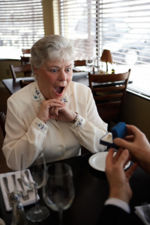Declining a Gift
From Giftypedia
Gifting is the global way of expression and way to nurture relationships. Most people are comfortable with receiving a gift, but few are comfortable with declining a gift. Why? Because most of the time, accepting a gift is what we do. Most of us have had little experience in how to politely refuse a gift.
However, there are circumstances when a gift should be declined. Overly generous gifts from co-workers and clients are the most common reason for refusing gifts. When accepting a gift could potentially damage a business relationship, then to tactfully decline the gift is the right thing to do. However, it must be done in a respectful manner in order to continue a good business relationship with the giver.
- Tip: When giving or receiving a business gift, review the business’s policy on accepting gifts from clients. If your business does business internationally, research the gift etiquette of those countries.
Appropriate reasons to consider declining a gift include:
- A gift given as a romantic overture where there is not mutual interest
- The gift giver spent more money than they should have on the gift
- The gift is a pet or something that you can't, or don't want to, take care of
- An "I'm Sorry" gift where the giver hasn't adequately apologized or shown appropriate remorse
- Gifts of a sexual nature from business relationships should always be returned
- Even small gifts from business associates must be declined if it is against office policy
How to Decline a Gift
Whatever the reason for declining a gift, here are some tips to remember:
- It is best to approach the giver in private and in person. When this is not possible, it is acceptable to write a letter.
- Thank the giver for their thoughtfulness taking care not to embarrass them.
- Express your regret for declining the gift and explain why you must do so.
- Return the gift to the giver. If the gift is from a business associate and they refuse to take the gift back, notify your superior and keep a record of your correspondence.
When Not to Decline a Gift
Never make a hasty decision to decline a gift. There are consequences in doing so that should be first considered. When a close friend, family member or loved one gives you a gift, there is usually love behind their gift. Refusing their gift can be perceived as refusing their love. How would you feel if the bracelet you so lovingly chose and saved for was rejected as being too extravagant? All of the anticipated pleasure derived from giving such a gift would be crushed.
Another instance when declining a gift would seem appropriate is when the recipient feels he/she can’t reciprocate. In this case, the obvious reaction is to politely decline the gift. Stop and think before declining! Rather than hurting feelings and crushing a relationship, it may be better to summon the courage to accept the love and generosity the giver intended.
Personal relationships can be complicated. Gifts given and received within these relationships can complicate matters even further. Therefore, it is important to receive respectfully and to know how and when to decline politely.
The "Pseudo" Decline
In many cultures, it is appropriate to decline or refuse a gift at least once before accepting it...
- In the US, for unexpected gifts it's common to say something to the affect of "you shouldn't have, I can't accept this" in a thoughtful tone, or for impressive gifts "this is way too generous" in an astonished tone. Doing this highlights the thoughtfulness and/or generosity of the giver and shows that you are appreciative of their gift.
- In Japan, it is considered polite to decline a gift once or twice before accepting it.
- In China, the custom is to refuse the gift 3 times before accepting it. The giver will continue to insist that you take it.
- In Hong Kong, it can be seen as greedy if you accept a gift right away and should refuse a gift several times before accepting it.
Related Guides
- When you Should Give a Gift
- Etiquette for Office / Business Gift Giving
- Receiving a Gift
- International Gift Customs
- How to Avoid Controversial or Inappropriate Gifts




 Printer Friendly
Printer Friendly
